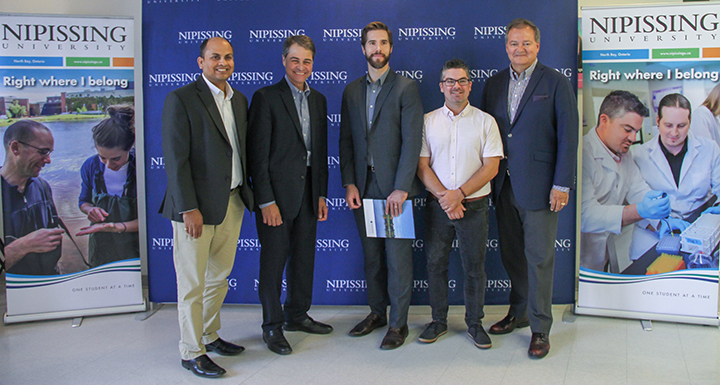NU researchers garner Canada Foundation for Innovation grants

Researchers at Nipissing University have earned $707,506 in government grants to purchase state-of-the-art specialized equipment and construct the Human Evolution Laboratory.
Canada Foundation for Innovation (CFI) is investing $353,753 for the two projects. That money is being matched by the provincial government’s Ministry of Research, Innovation and Science (MRI).
Dr. Steven Arnocky, associate professor of psychology, earned $261,386 in CFI and MRI funding to build the Human Evolution Laboratory. His research aims to clarify the complex interplay between personality, hormones, and social context and how such factors interact to predict intimate partner violence and sexual violence.
Dr. Mukund Jha, professor of Chemistry; and Dr. Justin Carré, together received $446,120 from CFI and MRI to purchase a Liquid Chromatography-Mass Spectrometry instrument for the reliable analysis of small organic molecules at minute concentrations. Dr. Jha’s research looks to discover novel organic agents critical for developing pharmaceuticals/drugs, agrichemicals and other materials for commercial applications, ultimately impacting the health and well being of Canadians. Dr. Carré's lab aims to clarify how personality, hormones, and social context apply to human aggression. It has the potential to transform our basic understanding of the risk factors for aggression.
The funding was announced at the university on Friday, September 15, by Anthony Rota, Member of Parliament for Nipissing-Timiskaming.
The CFI funding is provided through theJohn R. Evans Leaders Fund, which allows universities and researchers across Canada to carry out ground-breaking research in world-class facilities.
Nipissing also received an additional $106,000 from CFI’s Infrastructure Operating Fund to help with incremental operating and maintenance costs.
“I am pleased that the Government of Canada is supporting the research needs of Dr. Steven Arnocky, Dr. Mukund Jha and Dr. Justin Carré so they may continue their important work and add to Nipissing’s growing reputation for academic excellence and successes,” said Anthony Rota, Member of Parliament for Nipissing-Timiskaming.
"Nipissing University thanks the Federal government and the CFI, as well as the Provincial government, for this welcome investment in our research infrastructure. As Nipissing celebrates its 25th anniversary this year, we can take great pride in the burgeoning research culture that has evolved on this campus,” said Dr. Mike DeGagné, Nipissing University president and vice-chancellor.
“This funding directly impacts our ability to continue to perform leading-edge research that benefits all Canadians. Nipissing is dedicated to supporting and nurturing research and scholarship, and as Canadians we should all be proud that our government shares that dedication."
"On behalf of my colleagues, Dr. Jha and Dr. Carré, I offer thanks to the CFI, MRI and the federal and provincial governments for this investment in our research,” said Dr. Arnocky. “Investments such as this allow us to access leading-edge scientific equipment and construct efficient, innovative labs, greatly enhancing our capacity to explore ideas and create new knowledge that befits all Canadians. Our students also benefit directly by receiving extensive hands-on training in cutting edge methodology and equipment, helping to prepare them for future success in graduate programs and/or research in private industry."
“Our scientists need the best tools and equipment for ground-breaking research and discovery, and we are committed to ensuring they have them. Their successes will lead to an improved economy and will fuel an active research community here in Canada and internationally,” said the Honourable Kirsty Duncan, Minister of Science.
Background
Dr. Steven Arnocky
Together, Intimate Partner Violence and non-partner sexual violence comprise a pervasive global public health problem. What are the mechanisms influencing one's probability of engaging in these types of violence? What are the endocrine and immunological health consequences of being victimized? These are just two research questions being pursued by Dr. Arnocky's program of research. To address these questions, Dr. Arnocky's lab uses theory and methodology from evolutionary, social, experimental, and personality psychology, alongside neuroendocrinology, immunology, and pharmacology. His research aims to elucidate the complex interplay between personality, hormones, and social context and how such factors interact to predict violence. In the 2014 General Social Survey, Statistics Canada reported that approximately 168,000 women and men reported being victims of Intimate Partner Violence. Moreover, 553,000 women and 80,000 men reported being victims of sexual assault. These types of violent behaviour are thus important Canadian social issues. Findings from Dr. Arnocky's program of research has the potential to transform our core understanding of the causes of these types of violence, to inform effective treatment and prevention strategies, and ultimately contribute to the safety and well-being of Canadians.
Dr. Mukund Jha and Dr. Justin Carré
The study of small molecules in animals and plants is critical in developing sound understandings of essential functions such as self-defense, communication, behaviour, and disease pathogenesis. Funds are requested to purchase a Liquid Chromatography-Mass Spectrometry instrument for the reliable analysis and/or characterization of small organic molecules at minute concentrations to support leading edge research at Nipissing University by Dr. Mukund Jha and Dr. Justin Carré. Dr Jha's research program encompasses: (1) Examining the medicinal and commercial importance of mushrooms from forests in Northern Ontario, (2) Development of anticancer drugs, and (3) Development of synthetic chemistry around industrially and medicinally important small molecules. The findings will lead to novel organic agents critical for developing pharmaceuticals/drugs, agrichemicals and other materials for commercial applications, ultimately impacting the health and well being of Canadians. Dr. Carré's lab aims to elucidate how personality, hormones, and social context give rise to the emergent variability in human aggression. The findings from this program of research have the potential to transform our basic understanding of the risk factors for aggression. A better understanding of the basic risk factors for aggressive behaviour can translate into the development of more effective intervention and/or treatment strategies, ultimately benefiting Canadians through creating a safer environment.
